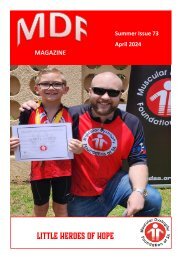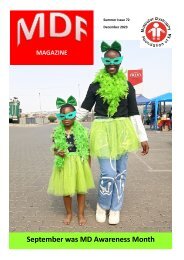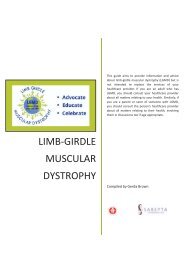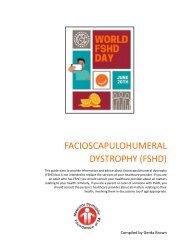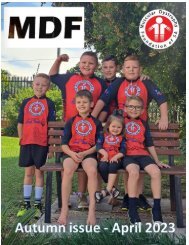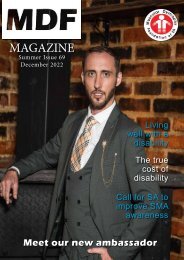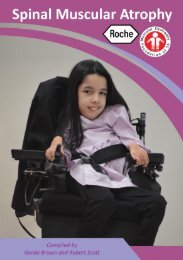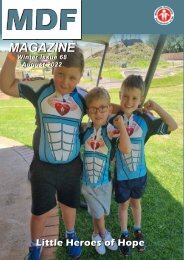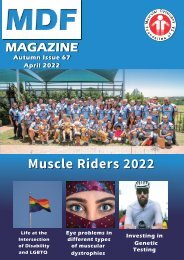MDF Magazine Issue 61 April 2020 (2)
You also want an ePaper? Increase the reach of your titles
YUMPU automatically turns print PDFs into web optimized ePapers that Google loves.
People
Researcher with FSHD Awarded MDA Funding
to Discover New Therapies for the Disease
By Jeanene Swanson
Originally published online by
The Muscular Dystrophy Association
19 June 2019
clinical trials.
Although Justin has never known life
without the symptoms of FSHD, he hasn’t let
the disorder get in the way of accomplishing his
goals. Instead, his desire to work on his disease
led him to Yale University, where he is now
completing a postdoctoral fellowship in the lab
of Monkol Lek. Recently, Justin was awarded an
MDA development grant of $140,000 over two
years to carry out research studying potential
therapeutics for treating FSHD. The award was
made in conjunction with a grant from the Chris
Carrino Foundation for FSHD.
Like many pre-medical students, Justin Cohen
discovered along the way that what he really
liked was research. However, unlike others who
exchange the stethoscope for a microscope,
Justin had a strikingly different motivating
factor — he has been living with the disease
he studies, facioscapulohumeral muscular
dystrophy (FSHD), for almost as long as he can
remember.
Upon enrolling as an undergraduate in pre-med
at Tufts University in Boston, Justin wanted to
be a neurologist. A research internship at the
Boston Biomedical Research Institute (BBRI)
opened his eyes to the possibilities of using his
background to study FSHD.
“When I got into research, I realized I was
much more into discovering the causes of the
disease and figuring out a way to develop a
treatment for it instead,” he says. While at the
BBRI, he was able to interact with scientists at the
Senator Paul D. Wellstone Muscular
Dystrophy Cooperative Research Center for
FSHD, which used to be located within the BBRI
before the institute closed its doors. The Wellstone
Center, which is now located at the University of
Massachusetts Medical School, aims to
understand the causes and pathology of FSHD.
Its large muscle tissue and cell repository and
biomarker database are resources available
to scientists conducting FSHD research and
Growing up with FSHD
Justin was born and raised in Kingston, N.Y.,
a small town tucked snugly into the leafy Hudson
Valley region of upstate New York. It wasn’t
until Justin, who is now 28, was about 4 years
old that he experienced his first symptom of
FSHD, hearing loss. FSHD is a genetic muscle
disorder that leads to progressive degeneration
of muscles, with the most pronounced effects
appearing in muscles of the face, shoulder blades,
and upper arms. Around that time, his parents
started looking into what could be the cause.
Even though he was still able to walk normally,
he had some muscle weakness, especially in the
face. His parents took him to see a neurologist,
who eventually diagnosed Justin with FSHD. It
was later confirmed with a genetic test.
At around 12 years old, he “really started to get
a limp in my leg,” and by the time he was in
high school, Justin was alternating walking with
crutches and using a wheelchair. By the time he
graduated, he had lost much of his ability to walk
and was using a wheelchair almost all the time.
That didn’t affect his love of science — in fact, it
made the obstacles worth overcoming.
“I was really into the sciences when I was
growing up, very interested in biology,” he says.
Once he started taking higher-level biology
classes, he was able to understand his disease
more. “I was tired of gradually losing my ability
to do simple tasks, and I wanted to do whatever
I could to develop treatments for FSHD.”




